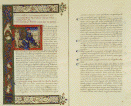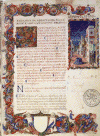
Euclid's "Elements," written about 300 B.C., a comprehensive treatise on geometry, proportions, and the theory of numbers, is the most long-lived of all mathematical works. This manuscript preserves an early version of the text. Shown here is Book I Proposition 47, the Pythagorean Theorem: the square on the hypotenuse of a right triangle is equal to the sum of the squares on the sides. This is a famous and important theorem that receives many notes in the manuscript.
Vat. gr. 190, vol. 1 fols. 38 verso - 39 recto math01 NS.01

In the early 1450's, Pope Nicholas V commissioned Jacobus de Sancto Cassiano Cremonensis to make a new translation of Archimedes with the commentaries of Eutocius. This became the standard version and was finally printed in 1544. This early and very elegant manuscript may have been in the possession of Piero della Francesca before coming to the library of the Duke of Urbino. The pages displayed here show the beginning of Archimedes' "On Conoids and Spheroids" with highly ornate, and rather curious, illumination.
Urb. lat. 261 fol. 44 verso - 45 recto math02 NS.17

The early Renaissance artist Piero della Francesca developed a mathematically rigorous system of perspective on which he wrote the treatise "De prospectiva pingendi." His interest in mathematics increased as he grew older and late in his life he wrote two other treatises, a "Trattato d'abaco," on algebra and the measurement of polygons and polyhedra (solids), and "De quinque corporibus regularibus," on the five regular polyhedra, which survives only in this unique manuscript from the library of the Duke of Urbino. The figures are said to be by Piero himself. Shown here are the inscriptions of an icosahedron (a solid composed of twenty equilateral triangular faces) in a cube, and of a cube in an octahedron (a solid of eight equilateral triangular faces).
Urb. lat. 632 fols. 40 verso - 41 recto math03 NS.18

Euclid's "Optics" is the earliest surviving work on geometrical optics, and is generally found in Greek manuscripts along with elementary works on spherical astronomy. There were a number of medieval Latin translations, which became of new importance in the fifteenth century for the theory of linear perspective. This technique is beautifully illustrated here in the miniature of a street scene in this elegant manuscript from the library of the Duke of Urbino. It may once have been in the possession of Piero della Francesca, who wrote one of the principal treatises on perspective in painting.
Urb. lat. 1329 fol. 1 recto math04 NS.19

William of Moerbeke was the most prolific medieval translator of philosophical, medical, and scientific texts from Greek into Latin. This is the holograph of his translation of the greatest Greek mathematician, Archimedes, with the commentaries of Eutocius. The translations were made in 1269 at the papal court in Viterbo from two of the best Greek manuscripts of Archimedes, both of which have since disappeared. Shown here is a part of Eutocius's commentary on Archimedes' "On the Sphere and the Cylinder" in which he reviews solutions to the classical problem of the duplication of the cube, i.e. how to construct a cube twice the volume of a given cube.
Ottob. lat. 1850 fols. 36 verso - 37 recto math05 NS.52